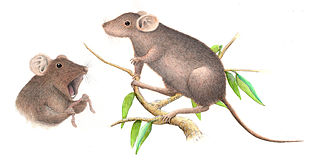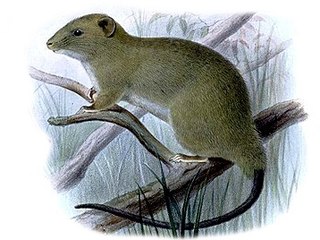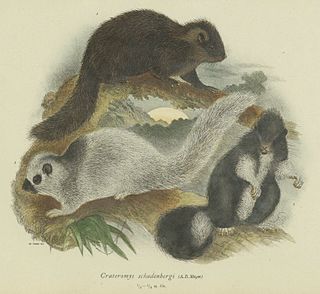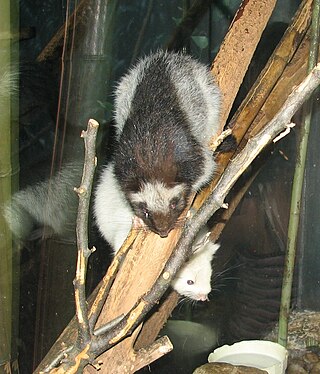
Apomys, commonly known as earthworm mice, is a genus of rodent endemic to the Philippines. Mice belonging to this genus are generally called Philippine forest mice and can be found on most islands of the Philippines except in Palawan, the Sulu Archipelago, and the Batanes and Babuyan group of islands.

Batomys is a genus of rodent endemic to the Philippines. It has six extant described species.
Sooretamys angouya, also known as the rat-headed rice rat, and Paraguayan rice rat, is a rodent species from South America. It is found in northeastern Argentina, southern Brazil and Paraguay in forested areas within the Atlantic Forest and cerrado. Since 2006, it has been classified as the only species in the genus Sooretamys; previously, it was included in the genus Oryzomys. Its taxonomic history has been complex, with the names Oryzomys angouya, Oryzomys buccinatus, and Oryzomys ratticeps in use for various parts of the species at different times. Some variation in its karyotype has been reported, with 2n = 80 to 82 and FN = 88 to 90.

The Camiguin forest mouse is a forest mouse endemic to the island of Camiguin in the southern Philippines. It has large ears and eyes, a long tail and rusty-brown fur, and it feeds mostly on insects and seeds. This description is based on mice captured during a biological survey conducted in 1994 and 1995 high on the steep slopes of one of the island's volcanoes.

The Luzon broad-toothed rat is a species of rodent in the family Muridae.

The large Mindoro forest mouse is a species of rodent in the family Muridae, from the genus Apomys. It is found only in the Philippines. Its natural habitat is subtropical or tropical moist montane forests. It is a large mouse with large feet, a long tail and an elongated snout which is morphologically unique within its genus. It is covered in soft fur which is mostly dark brown in colour. Its closest relative is thought to be the Luzon montane forest mouse, based on genetic and morphological similarities.

The Luzon forest rat or Luzon hairy-tailed rat is one of five species of rodent in the genus Batomys. It is in the diverse family Muridae. This species is found only in the Philippines. This species was the first of the five to be identified and stayed the sole indicator for the genus for roughly 75 years, until 1988. Majority of this species lives on Mount Data which is one of several mountains in the Cordillera Mountains region of Northern Luzon.

The Bagobo rat is one of four species of rodent in the genus Bullimus in the Muridae family.

The Large Luzon Forest Rat, or Luzon Forest Rat is a species of rodent, the first of three to be described in the genus Bullimus. It is in the diverse family Muridae. It is found only in the Philippines. The rat has been recorded in Aurora, Benguet, and Camarines Sur provinces, and in Balbalasang, Kalinga province.

The short-footed Luzon tree rat or greater dwarf cloud rat is a species of rodent in the family Muridae. It is found only in the Philippines, specifically in northern Luzon. Its natural habitat is tropical moist montane forests.

Carpomys is a genus of rodent in the family Muridae. It contains two extant species, and one extinct species:

The blazed Luzon shrew rat is a species of rodent in the family Muridae, endemic to the Philippines.

The giant bushy-tailed cloud rat or Luzon bushy-tailed cloud rat is a large, endangered species of rodent in the family Muridae. It is only found in pine and mossy forest at altitudes of 2,000–2,740 metres (6,560–8,990 ft) in the Central Cordillera of Luzon, the Philippines. Relatively little is known about its behavior, but it is nocturnal, mainly arboreal and feeds on various types of vegetation.

Crunomys is a genus of rodent in the family Muridae native to the Philippines and Sulawesi. It contains the following species:

Eliurus is a genus of rodent in the family Nesomyidae. It contains the following species:
Oecomys speciosus, also known as the savannah oecomys, arboreal rice rat, or Venezuelan arboreal rice rat, is a species of rodent in the genus Oecomys of family Cricetidae. It ranges over northeastern Colombia and much of Venezuela, including the island of Trinidad. This rodent lives in tropical rainforest and tropical dry forest, including secondary forest and gallery forest, as well as in savanna habitat.

Phloeomys, the slender-tailed cloud rats, is a genus of large rodents in the family Muridae. Both species in this genus are endemic to the island of Luzon in the Philippines. Although their tail is covered by hairs, it is considerably less dense and shorter than in the rarer bushy-tailed cloud rats that also inhabit the Philippines.

Camiguin forest rat, or Camiguin bullimus is one of four species of rodents in the genus Bullimus. It is endemic to the island of Camiguin, the Philippines.

Rattini is a very large, diverse tribe of muroid rodents in the subfamily Murinae. They are found throughout Asia and Australasia, with a few species ranging into Europe and northern Africa. The most well-known members of this group are the true rats, several species of which have been introduced worldwide.
The Carleton's forest rat is a species of rodent in the genus Bullimus and the family Muridae. It is reported from the Caramoan Peninsula in southern Luzon, Philippines in the year 2021 by Heaney et al. B. carletoni is associated with partially disturbed forest habitat over limestone and ophiolitic soils. It is a nocturnal animal and endemic to Philippines.























